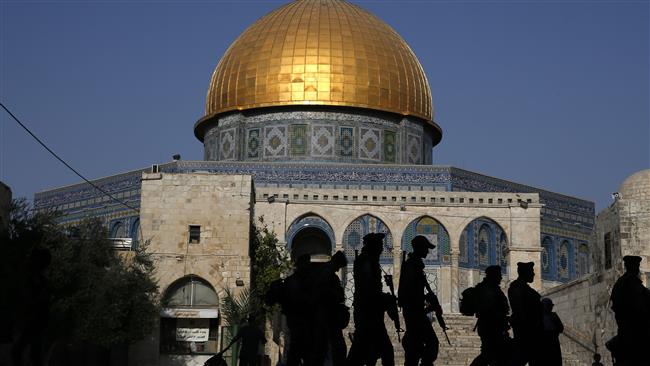
RNA - Yehuda Glick, of the right-wing Likud party, and Shuli Moalem-Refaeli, of the far-right Jewish Home party, toured Tuesday the Haram al-Sharif, which Jews call Temple Mount, in the Old City of East Jerusalem al-Quds.
The legislators were accompanied by heavily-armed Israeli policemen.
The visits were made possible after Israeli Prime Minister Benjamin Netanyahu lifted the two-year ban on lawmakers’ entry into the site for a trial period to test the waters and determine if they would provoke tensions.
The move angered the Palestinians, with Nabil Abu Rudeineh, spokesman for Palestinian President Mahmoud Abbas, condemning the visits as provocative.
He said Israeli provocations at al-Aqsa Mosque will lead to dire consequences whose responsibility will be of Tel Aviv alone.
Jordan, the custodian of the al-Aqsa Mosque compound, also censured the visits as “unacceptable,” saying that Israel’s “irresponsible decision will increase tension and escalation at a place holy to all Muslims.”
Jordanian government spokesman, Mohammad al-Momeni, called on the Tel Aviv regime “as the occupying power to take measures to prevent provocations by extremists against the Al-Aqsa Mosque.”
Moreover, Israeli lawmaker Masud Ghnaim said allowing right-wing politicians at the al-Aqsa compound had “the goal of provoking Arab and Muslim sentiment and inflaming the situation.”
Another Israeli legislator, Ahmad Tibi, also accused the right-wing Israeli lawmakers of seeking to change the status quo of the site.
“The Arab MKs come to their home, to their mosque. But the right-wing extremist MKs storm the mosque with the protection of ... police, and they are the same ones who want to change the status quo to allow them to pray in the courtyard of the mosque,” he added.
In October 2015, Netanyahu barred Israeli lawmakers from visiting the al-Aqsa Mosque compound. The order was meant to calm unrest that erupted in part over Palestinian fears that Israel was planning to assert further control over the mosque complex.
In the most recent round of tensions, violence erupted after a deadly shootout on July 14 outside the Haram al-Sharif.
Using the gunfight as a pretext, Israel set up metal detectors and surveillance cameras at entrances to the al-Aqsa compound.
The restrictive measures sparked criticism worldwide, with Palestinians saying that the bans were meant to expand the regime’s control over the holy site.
On July 24, Tel Aviv backed down in the face of protests as well as violent clashes and removed all the restrictions at the al-Aqsa compound.
847/940